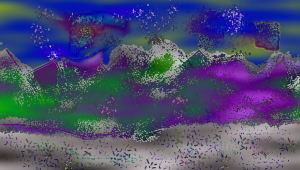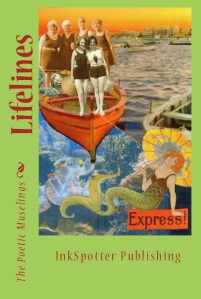I was cleaning out my files in a so-far futile attempt to organize them and came across a couple of flash fiction pieces I thought I’d share with y’all.
About Chuck’s Chicken
I was pulling up to the drive-through at McDonald’s when the story below came to me. No, it was not inspired by a real incident.
Chuck’s Chicken
I rolled up to the takeout window at Chuck’s Chicken, Where The Chickens are Still Clucking and stuck my head out the open car window, sucking in a large breath of the damp, heavy summer air.
“Waddle it be, sweetie?” The guy, bald, and at least 300 pounds, leered at me. His name tag read, “Chuck.”
“Two thighs, a side of corn, a side of mashed potatoes, and corn bread. No gravy on the potatoes. Oh, and a large lemonade.”
I waited for Chuck to repeat my order back to me. Instead he held up a hand, gesturing STOP, and turned away from me. I heard a voice yelling from inside the restaurant.
“Chuck, that chicken you wanted me to slaughter? I chopped off its head, but it’s running around the kitchen, and it’s dripping blood everywhere.”
“Al, you idiot, I told you to kill the damn bird out in the yard.”
I swallowed, started my car and drove away. And here I’d thought when Chuck said, Still Clucking, he’d been feeding me a line.
About Mad Hatter Town Planners
When he was in middle school, my youngest son and I would wonder about how some of the roads near our house on the cape got their names; Rascally Rabbit Road was one of them.
Our conclusions inspired the story below. The town meeting is entirely a figment of my imagination. The only thing inspired by a real incident is the bit about the fire.
Mad Hatter Town Planners
I fell down the rabbit hole straight into the town planning committee meeting. A large basin of Sangria sat in the middle of the scratched wood table in the center of the room, and a keg rested against the back wall. Al, Stan, and Art were already there.
Stan wore a suit, and sweat dripped down his face into his long gray hair as he peered over Art’s shoulder.
“It’s my Mother-in-law’s recipe,” Art was saying as I walked in. Light reflected off his head, bald and smooth as an egg. He wore Khaki shorts and a very old Boston Pops t-shirt. His glasses were new, though: a snappy pair with a silver frame.
“Hey, Pete, have some Sangria.” Art handed me a large glass without waiting for my answer. The outside was still wet. I wiped my hand on my pants, leaving a purple stain on my new khaki shorts.
I took a sip. It was good. “What’s in this?”
“My father-in-law makes the wine himself. He gifted us with a barrel or two. We had to buy the fruit.” Art grinned. His father-in-law was over eighty, and Art claimed he still kept his savings in a suitcase under his bed.
“So what’s the big crisis? I planned to spend the evening playing miniature golf with my grandkids.” I pulled out a chair across the table from Art and dropped into it.
“We need to name some streets in order to incorporate.” A shaft of sunlight reflected off Art’s thick glasses.
“They have names: Main street, Railroad Street, New Street.” I brushed at the stain on my shorts. It didn’t help.
Stan pulled a pen from his shirt pocket, which was white and sported a large blue stain. “We applied to be part of Wonderland. A couple of our names are duplicates of theirs, and some of the others are confusing: Bay Street, Bay Road, and the like. I want to rename everything iffy so people won’t get lost. I thought we could come up with something original. All we have to do is pick names and drop the list off. They’re all set to approve us when we do.” He flipped open his notepad and scribbled something.
“I assume we have the list of existing Wonderland street names.” I took a long drink of the sangria, almost swallowing a piece of lemon at the bottom of the glass.
“Yes, and the list of ours, too. We’ve got the duplicates and the confusing ones marked.” Stan flipped to another page and passed me his notebook.
“Why not meet another night?” I glanced at the list. It was long. I handed the notebook back to Stan.
“Because I’ll be out of town after tonight. My daughter just had twin girls. We’re going out there for a month, maybe longer.” Al drained his glass of Sangria and poured himself another. Some spilled down his shirt. It was one of those nice polo shirts with a collar and some kind of logo.
Mort, the final member of our team, strolled in, dropping his pile of library books onto the table and flopping into a chair. He was young, only fifty-five or so, but he’d retired early. “Remind me why we need to be part of Wonderland.”
Art handed Mort a glass of Sangria, which he drained and handed back to Art. Art poured him another glass.
“So we can be part of their emergency services: police, fire, and all that. They have a full-time fire department, not just volunteers on call. To do that, we need to rename some streets.” Stan passed Mort his notebook.
Mort dropped the notebook onto the table before taking another healthy swig of Sangria. “So?”
Art got up and refilled all of our glasses before turning to Mort. “That’s right, you’re new. My son’s house burned to the ground last year. He had to drop his kids from the second story window. My granddaughter Maria was screaming, ‘Daddy, don’t. They hadn’t even rounded up the so-called volunteer firemen. The chief had his phone turned off. Maria broke both legs.”
“All right, so what are we going to name those streets?” Mort finished his glass of sangria, and Art poured him another.
“Merciful Marvin Meadows. Treacherous Tom’s Twisty Trail Jabberwocky Junction.” I hiccuped. I’d had four, maybe five glasses of Sangria by then.
Time passed. We drank and named streets.
“No more,” I said, peering into the now empty tub. “Time to go home.” I tried to get my car keys but they kept falling on the floor. Art, Al, Stan, and Mort were no better.
We called Town Taxi to come pick us up. We must have dropped off the list of names but I really don’t remember. The next thing I knew my wife was shaking me awake. Sun streamed in the window. When I peered at the clock, it read noon.
“Al says Wonderland has approved the new street names and we’re now officially part of town.”
I sat up and groaned. My aching head! “So what’s the problem?”
“You boys really tied one on. Some of those names…”
“Art had a tub of Sangria. His father-in-law gave him a couple of barrels of his wine.” I pressed my hands to my pounding head. “Can you get me a couple of aspirin?”
“No, honey, you can get them yourself.” She turned and left. I rolled over, pulled the pillow over my head, and went back to sleep.
And that’s why I, Peter Piper, now live on Picked A Pickle Pepper Path.
 For some reason, yesterday I was thinking about recognizing a piece of music, and I realized that there are a goodly number of opera arias that I would have no trouble identifying, including many from Madam Butterfly, Rigoletto, Il Trovatore, and Aida, to name a few.
For some reason, yesterday I was thinking about recognizing a piece of music, and I realized that there are a goodly number of opera arias that I would have no trouble identifying, including many from Madam Butterfly, Rigoletto, Il Trovatore, and Aida, to name a few.










